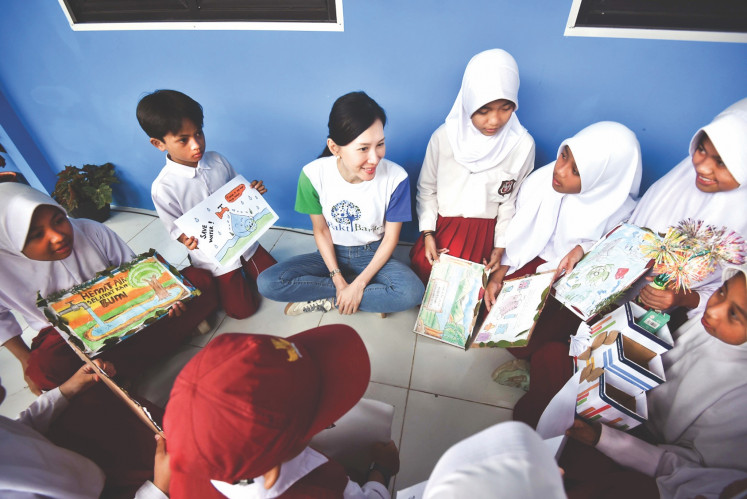Popular Reads
Top Results
Can't find what you're looking for?
View all search resultsPopular Reads
Top Results
Can't find what you're looking for?
View all search resultsA comprehensive trip to Borobudur from your couch
Getting around: Eko Pramono, a Google mapping operator, carries a Street View Trekker apparatus around Borobudur Temple in Magelang, Central Java
Change text size
Gift Premium Articles
to Anyone
G
span class="caption">Getting around: Eko Pramono, a Google mapping operator, carries a Street View Trekker apparatus around Borobudur Temple in Magelang, Central Java.
Giant search engine Google now makes it possible for globe travelers to experience the world's wonders even before booking a tour package.
Launched on Sept. 27 across Google platforms ' Google Maps, Street View and the Cultural Institute ' users can access panoramic, 360-degree imagery of Borobudur Temple, which is listed as a UNESCO World Heritage Site, from their mobile devices.
In partnership with the Culture and Education Ministry, Tourism Ministry and the agency managing the maintenance of the temple and other heritage sites in the vicinity ' PT Taman Wisata Candi Borobudur, Prambanan dan Ratu Boko ' Google released a number of virtual tours of the site, located in the Central Java town of Magelang, a one hour drive from Yogyakarta.
Google Indonesia's head of public policy and government relations Shinto Nugroho explained that Borobudur Temple was chosen to mark the digitalization of Indonesia's heritage sites because it met a number of criteria.
'Borobudur Temple is a heritage site with amazing architecture and it's also a main tourist destination,' she said at a launch event held at the temple compound, in conjunction with Google's 17th anniversary.
'It's in our mission to organize information about the world, make it accessible and useful for everyone,' she added.
Delivered in street view style, which allows viewers to zoom in on the nooks and crannies of the temple, the Google Cultural Institute has added value to the information available online.
'What we do here is to add context and stories to the imageries,' said UK-based Google Cultural Institute program manager Dennis Dizon.
Having been present in Indonesia since 2012, the Cultural Institute has the National Museum as its first partner and so far has produced nine virtual exhibitions and 238 imageries of the museum's assets.
Aside from the museum and artifacts, the Cultural Institute also archives intangible culture and heritage on its platform.
'We are currently partnering with a contemporary art community in Indonesia for our next project in the country,' said Dizon.
'By presenting Street View Borobudur and the Indonesian entry at the Cultural Institute for the first time ever, we hope it can help in keeping the culture and history of Indonesia on record while inspiring more people to come and appreciate our heritage,' Shinto added.
Tight precision: The Street View Trekker apparatus consists of 15 cameras that take photos simultaneously every 2.4 seconds.
A click on the orange 'pegman' on the bottom right will direct viewers to walk around the over 15,000-square-meter temple, its nine-stacked platforms, 2,672 relief panels, 504 Buddha statues and its perforated stupas.
The imageries of the temple were captured by Street View Trekker, a 20-kilogram device carried on the back by the experienced trekker Eko Pramono.
The 1.2-meter device consists of 15 cameras, each with 5-megapixel resolution, which all click at the same time every 2.4 seconds to ensure an accurate capture of the imagery.
It may take several months to create street view imagery because the process itself is weather sensitive, according to Street View program manager Cynthia Wei.
'The process includes the editing of the imagery. The facial blur and the blur of vehicle license plates is also required to protect people's privacy,' she said.
With the purpose of boosting tourism in the region in mind, the launch also occurred in conjunction with World Tourism Day, which fell on the same date.
Taman Wisata Candi manager Purwanto said that the administrations of Yogyakarta and Central Java had set a combined target of 20 million tourists in 2019, 2 million of whom were expected to be foreign tourist arrivals.
The current number of tourists in the regions hovered at 260,000 per year, he said.
'We expect the collaboration with Google could help us reach the target,' Purwanto said at the launch.
'The project with the Google Cultural Institute has a dual purpose: While it attracts tourists and gives better understanding and knowledge on Indonesian tourist destinations, it can educate locals on interacting with tourists.'
Heavenly walk: Eko walks between stupas to accurately capture Borobudur Temple.
' Photos by JP/Tarko Sudiarno













